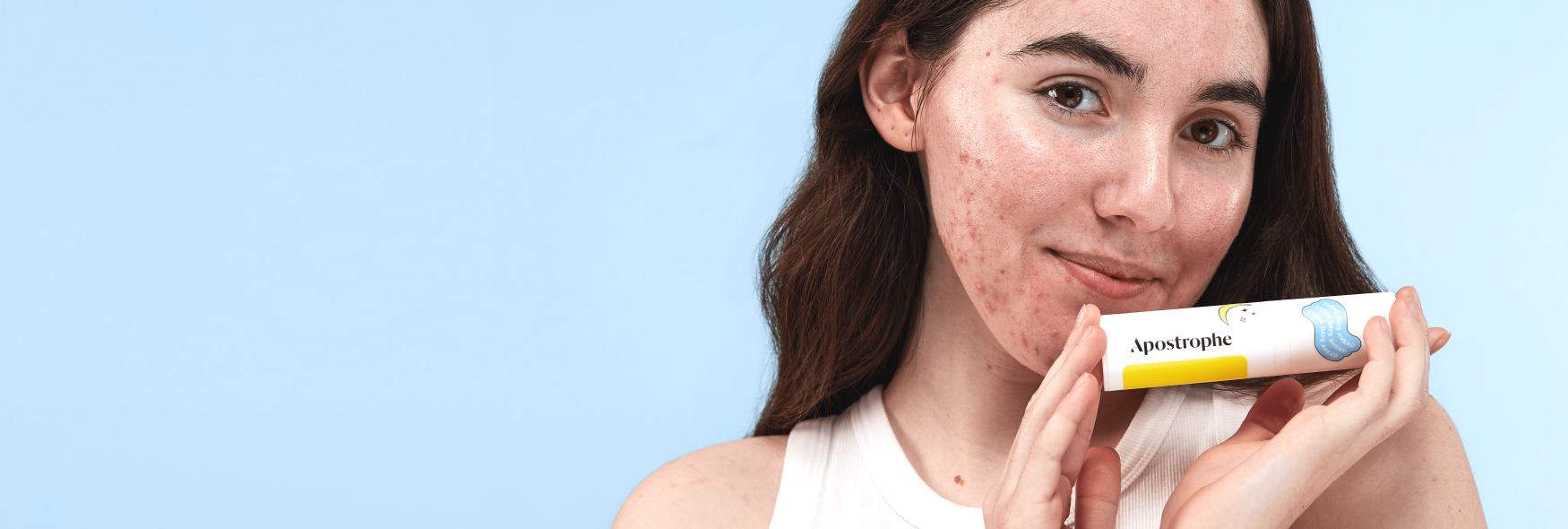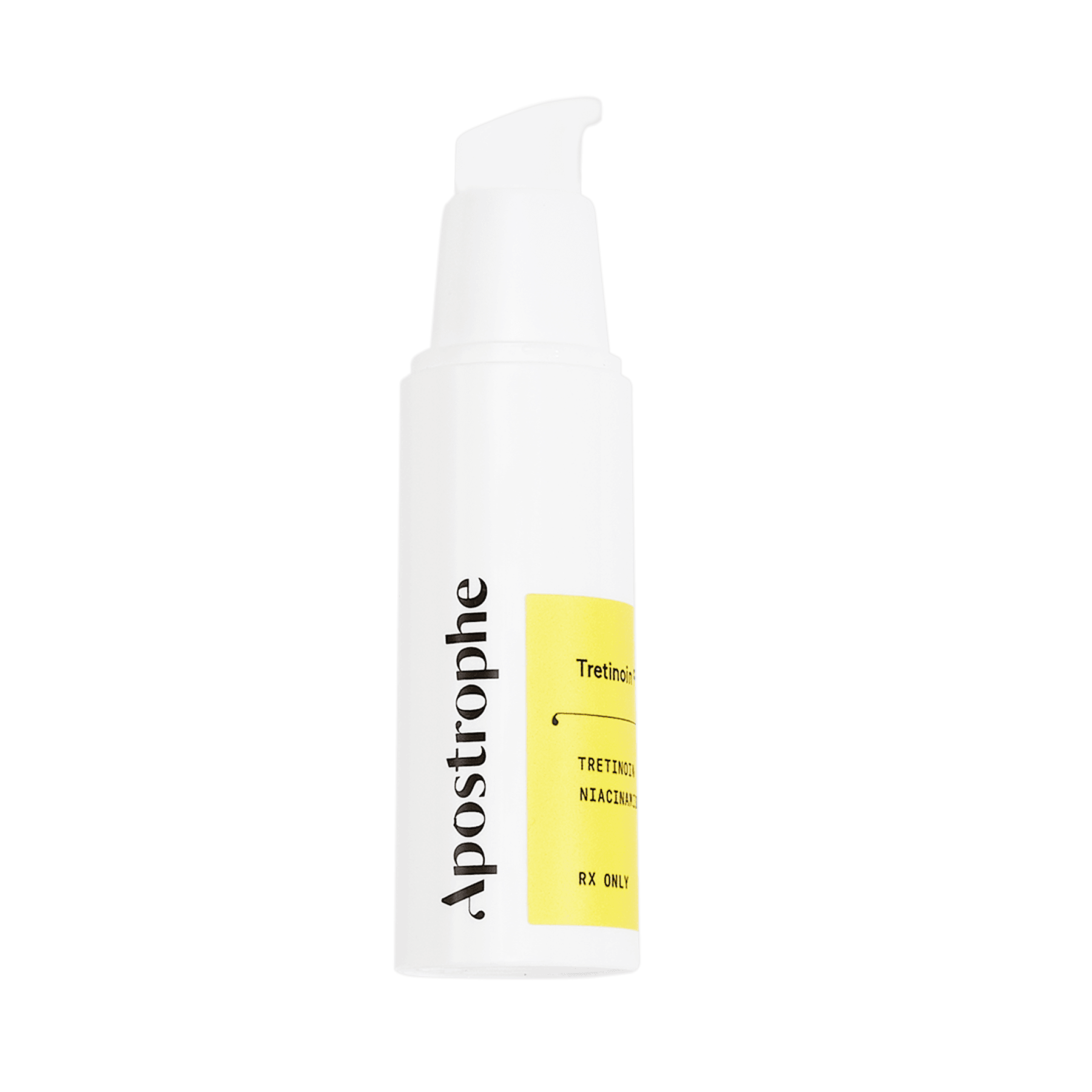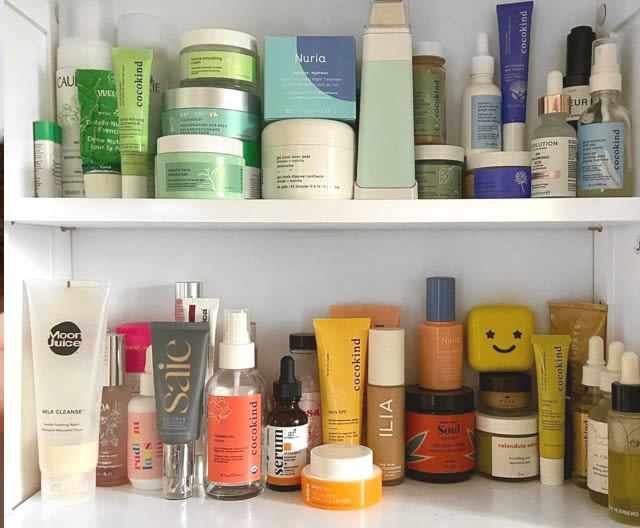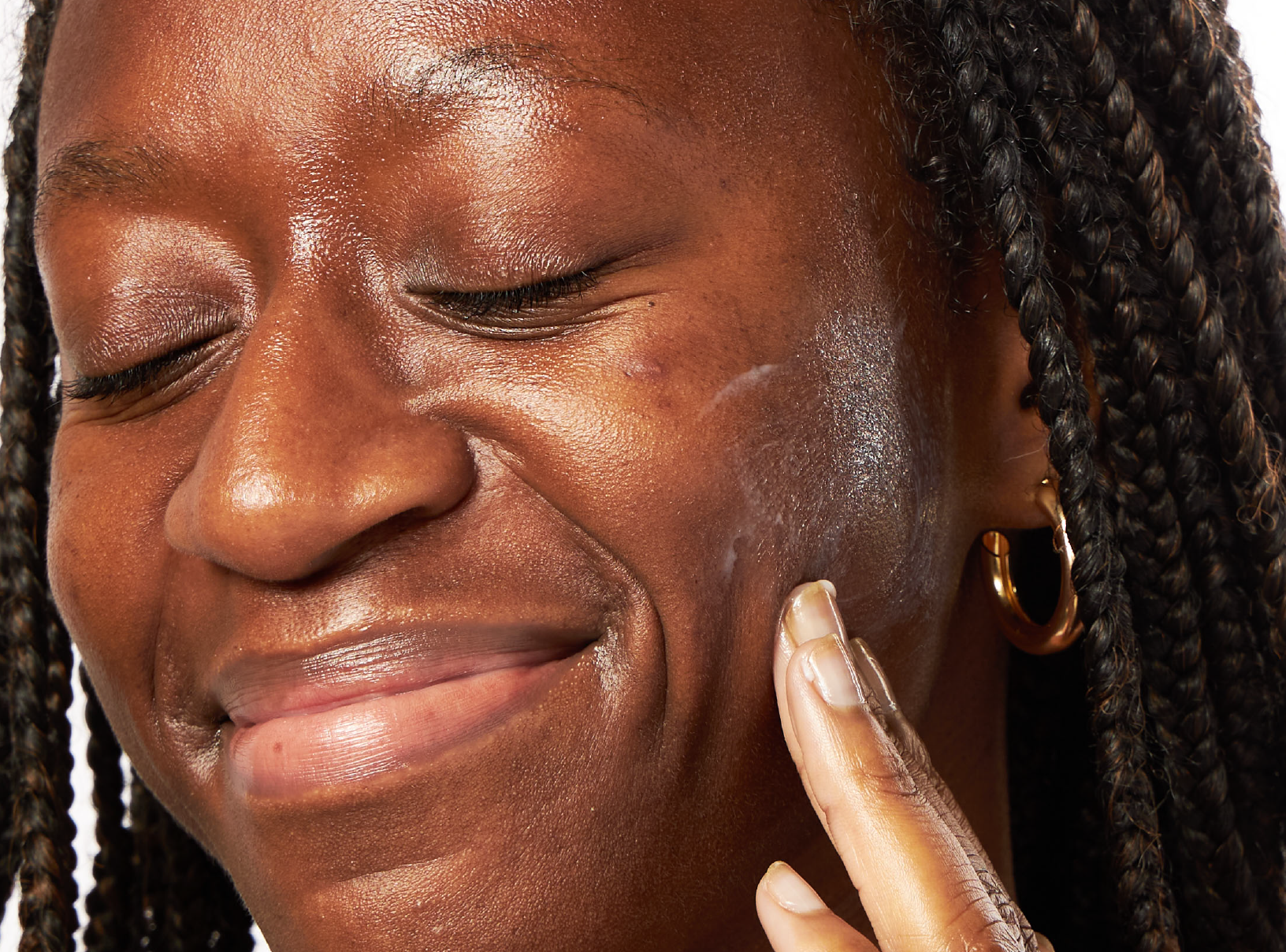Education
How to get rid of a zit overnight


SHARE
Education
How to get rid of a zit overnight
Medically reviewed by Vicky Davis, FNP
Written by Apostrophe Team
Last updated 4/1/2024
Nobody Googles “overnight zit treatment” for a good reason. We’re not sure what circumstances brought you to this moment, but whether it’s a big date, a presentation, picture day, or dinner with that toxic person that always judges your skin, you’re probably here looking for a lifeline.
Acne pops up at the worst times, and it tends to do that as if it knows this is its big moment to mess with your complexion and confidence.
Whether you’re dousing yourself in tea tree oil, covering your face in pimple patches, or scraping the dead skin cells from your face, you can put the emergency acne products down.
Acne is not something you can clear up before the break of dawn, and although some magazines might tell you otherwise, acne products on the market today aren’t going to make your zits “disappear” overnight.
There are treatments you can use to clear your skin quickly, safely, and effectively, but they’re not going to perform miracles.
Zits in Brief: How and Why They Happen
One of the biggest reasons that overnight acne treatments aren’t possible is the complex nature of acne itself.
Acne isn’t just clogged pores and sebum production — it’s a complicated imbalance in a microbiome the size of your pore.
Acne is one of the common skin conditions people lament. Zits are the result of a serious breakdown of your skin’s typical dead skin cell shedding process within your hair follicles.
The result of this breakdown is clogged pores, which can lead to acne due to the buildup of dead cells, excess oil production, and sometimes bacteria within the pore.
Plenty of things can trigger acne, including an imbalance due to poor diet or dehydration. It may even occur as a result of the climate’s toll on your skin, or simply from imbalances in one type of hormone, called androgens.
Androgens drastically increase your skin’s oil output through the sebaceous gland. Oil (also called sebum) is normally produced to lubricate dead cells so they slide out more easily, but it can also act like the perfect incubator for bacteria in the wrong circumstances.
How Zits Are Treated
As you can probably tell from the above information, acne is about rebalancing the various elements of skin health — decreasing sebum production, increasing moisture levels, removing lingering dead skin cells, and generally turning oily skin and dry skin into healthy skin.
To treat a zit, you must unclog the pore, disinfect the pore and get that pore back to full health.
You may also have to deal with irritated skin and skin inflammation, which aren’t things that are going to go away with a snap of a finger. Inflamed skin may take time to respond to treatments.
Hot water compresses, warm water compresses, clay masks, tea tree oil, and other natural ingredients are some common DIYs, but none of them are going to completely heal a breakout overnight from a single application — if they did, there wouldn’t be so many products on the market.
Topical medications and topical products are really effective for skin issues, but the worst thing that can happen is cause further damage in the form of a chemical burn or allergic reaction.
If you have sensitive skin or other complicating issues, rebalancing the microbiome in your pores is going to be even more complicated.
No, there’s not a miracle overnight option on this list. There are, however, many safe, effective acne treatments out there — they just may take time.
Sorry, Overnight Isn’t Going to Happen
Sorry, but getting rid of pimples overnight is a myth. You can think of a zit as a lot of things: a wound, an infection, a sore, or a skin irritation. Know what those things have in common? The healing process takes days or more.
Zits aren’t going to go away immediately, and one of the worst things you can do to your skin is try to force that change.
Scrubbing your face raw, popping the zit at home, squeezing it, or otherwise manipulating the skin in the affected area all may seem like ways to make it “go away,” but the momentary improvement from popping and picking at a zit is often quickly replaced by redness, further irritation, and the risk of spreading that bacteria to other pores.
This happens because when you improperly pop a pimple, you can let more bacteria in or push the bacteria deeper into your skin, causing more problems.
The otherwise safe and effective treatments, meanwhile, aren’t going to move very fast.
That’s why, at the American Academy of Dermatology, their first recommendation for people who are trying to deal with stubborn acne is to give the treatment four whole weeks to work.
Even stronger antimicrobials like benzoyl peroxide typically take at least five days to show results.
The Fastest Ways to Treat Zits
So what’s the fastest way to treat acne? Well, to never let them form in the first place. In fact, the prevention methods for acne have a lot in common with the treatment methods.
There’s a reason for that: acne control is about rebalancing your skin’s health, moisture levels, and other function factors to make your face and other areas a healthy place for skin cells and an unlivable place for bacteria.
Get Rid of the Excess Oil
Topical treatments for oil are easy to pick up over the counter. From blotting papers to astringents like witch hazel or certain masks, skin care products designed to help you remove excess oil can help you return balance to your skin.
For a stronger treatment, your healthcare provider might also recommend you consider medications like benzoyl peroxide or salicylic acid that are available over the counter, or opt for prescription treatments if things are more moderate or severe.
If You’re Dry, Moisturize
Dry skin is nobody’s friend, and while it may not seem as bad as oily skin, dryness can cause just as many problems.
A fragrance-free moisturizer could help, as could options that include topical hyaluronic acid: a skin-health compound that has been shown to help your skin and joints with the tough task of moisture retention.
Exfoliate Those Dead Cells
Got a build-up of dry, dead cells that won’t leave? It may take more than oil and dryness control to get the old layer scrubbed away to make room for the new cells.
Exfoliation is about more than scrubbing, though — it’s about helping your skin remove dead skin cells to reveal the healthy skin underneath. A chemical exfoliant like a retinoid will help with the dead cell problem, but it can also boost new cell growth for you.
Are things particularly bad? Consider a prescription treatment like tretinoin. Tretinoin has been helping skin since the 1960s, and studies show that when you use it, it can boost collagen production at the same time. If you want to see if tretinoin is right for you, consider starting a consultation through Apostrophe. Tretinoin is one of the ingredients that could be in your customized Apostrophe topical treatment.

PRESCRIPTION TRETINOIN
Target acne, dark spots, and signs of aging with this science-backed ingredient.
Make Healthy Skin Changes to Your Lifestyle
If you think treating zits overnight is a reactionary process, we’ve got bad news for you. Zits need to be fought with a prevention mindset.
That means that if you have acne issues, you might want to look at some things that have been correlated with acne: are you on a high glycemic diet, do your poor hydration skills fall short, or is general stress invading your life? If so, these things can cause skin issues.
Further down the line, these issues can potentially lead to conditions that go deeper than your skin, like diabetes or hypertension.
Besides, even if these things aren’t making zits pop up, there’s plenty of evidence that better dietary health benefits every organ and your whole body.
Preventing Zits and Clearing Up Your Skin
Prevention and treatment methods aside, your first step for clearer skin should be speaking with a healthcare professional about your acne concerns.
If you’re experiencing the occasional pimple, it’s a very different set of circumstances for treatment than if your acne is severe.
A healthcare professional will be able to get you on a treatment plan that will give you control back, so that you’ll be able to spend your time enjoying yourself, rather than googling overnight zit treatments.
Preventing Zits and Clearing Up Your Skin
Prevention and treatment methods aside, your first step for clearer skin should be speaking with a healthcare professional about your acne concerns.
If you’re experiencing the occasional pimple, it’s a very different set of circumstances for treatment than if your acne is severe.
A healthcare professional will be able to get you on a treatment plan that will give you control back, so that you’ll be able to spend your time enjoying yourself, rather than googling overnight zit treatments.
Want expert treatment for your skin concerns? Get connected with an expert derm team through Apostrophe and get a customized treatment plan for your skin.
12 Sources
American Academy of Dermatology Association. (n.d.). CAN THE RIGHT DIET GET RID OF ACNE? Retrieved March 5, 2021, from https://www.aad.org/public/diseases/acne/causes/diet.
Rodan, K., Fields, K., Majewski, G., & Falla, T. (2016). Skincare Bootcamp: The Evolving Role of Skincare. Plastic and reconstructive surgery. Global open, 4(12 Suppl Anatomy and Safety in Cosmetic Medicine: Cosmetic Bootcamp), e1152. https://www.ncbi.nlm.nih.gov/pmc/articles/PMC5172479/.
0 things to try when acne won't clear. American Academy of Dermatology. (n.d.). Retrieved October 4, 2021, from https://www.aad.org/public/diseases/acne/DIY/wont-clear.
Kraft, J., & Freiman, A. (2011). Management of acne. CMAJ : Canadian Medical Association journal = journal de l'Association medicale canadienne, 183(7), E430–E435. https://www.ncbi.nlm.nih.gov/pmc/articles/PMC3080563/.
Endly, D. C., & Miller, R. A. (2017). Oily Skin: A review of Treatment Options. The Journal of clinical and aesthetic dermatology, 10(8), 49–55. Retrieved from https://www.ncbi.nlm.nih.gov/pmc/articles/PMC5605215/.
Jegasothy, S. M., Zabolotniaia, V., & Bielfeldt, S. (2014). Efficacy of a New Topical Nano-hyaluronic Acid in Humans. The Journal of clinical and aesthetic dermatology, 7(3), 27–29. Retrieved from https://www.ncbi.nlm.nih.gov/pmc/articles/PMC3970829/.
Picardo, M., Ottaviani, M., Camera, E., & Mastrofrancesco, A. (2009). Sebaceous gland lipids. Dermato-endocrinology, 1(2), 68–71. https://www.ncbi.nlm.nih.gov/pmc/articles/PMC2835893/.
Acne. (n.d.). Retrieved January 28, 2021, from https://www.hopkinsmedicine.org/health/conditions-and-diseases/acne.
Sutaria AH, Masood S, Schlessinger J. Acne Vulgaris. updated 2021 aug 9. In: StatPearls internet. Treasure Island (FL): StatPearls Publishing; 2021 Jan-. Available from: https://www.ncbi.nlm.nih.gov/books/NBK459173/
Pappas A. (2009). The relationship of diet and acne: A review. Dermato-endocrinology, 1(5), 262–267. Available from: https://www.ncbi.nlm.nih.gov/pmc/articles/PMC2836431/
Palma, L., Marques, L. T., Bujan, J., & Rodrigues, L. M. (2015). Dietary water affects human skin hydration and biomechanics. Clinical, cosmetic and investigational dermatology, 8, 413–421. Available from: https://www.ncbi.nlm.nih.gov/pmc/articles/PMC4529263/
Jović A, Marinović B, Kostović K, Čeović R, Basta-Juzbašić A, Bukvić Mokos Z. The Impact of Pyschological Stress on Acne. Acta Dermatovenerol Croat. 2017 Jul;25(2):1133-141. Available from: https://pubmed.ncbi.nlm.nih.gov/28871928/.
Shop this post

Tretinoin
Like what you just read? Sign up for our email list to get the scoop on skincare science delivered straight to your inbox.

Education
What is milia?
What is milia? Today, we’re jumping into one type of bump that you may have heard about most commonly in infants — milia.
Read More
Education
Best moisturizer for acne-prone skin
If you have combination acne-prone skin, figuring out which moisturizer is best for your skin might be tough. In this guide, we break down the best moisturizer for combination, acne-prone skin.
Read More
Education
How to build a face care routine
As you get into skincare, it might seem overwhelming, especially trying to figure out the order you're supposed to apply products in. Below, we detail how to build a face care routine for your skin!
Read More
